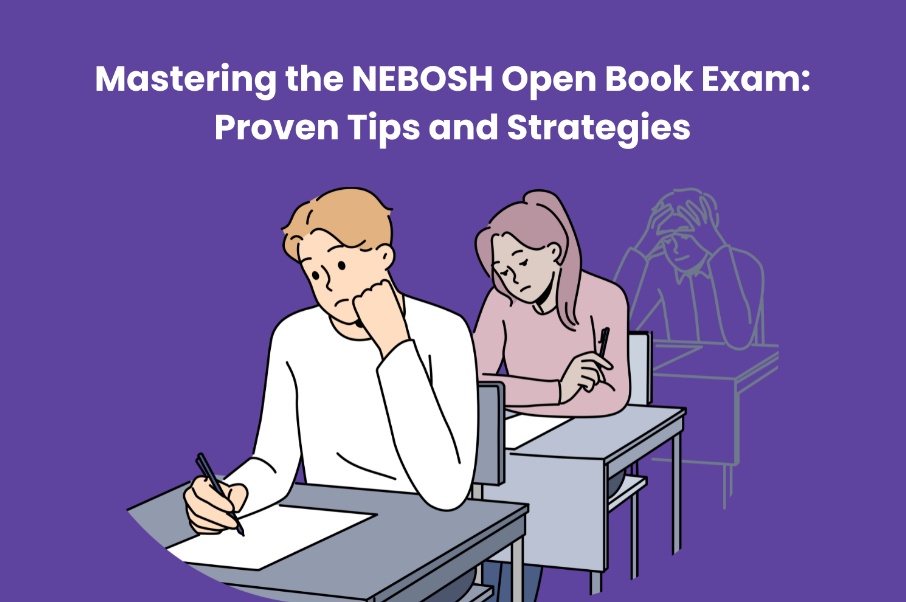Navigating through the NEBOSH Open Book Exam can be a challenging yet rewarding journey. This exam format, introduced as an innovative approach to assessing health and safety knowledge, allows candidates to reference materials during the exam.
Understanding how to effectively utilize this opportunity is key to success. In this blog, we'll explore practical tips and strategies to excel in the NEBOSH Open Book Exam and discuss how to approach the exam question paper effectively.
Understanding the NEBOSH Open Book Exam Format
The NEBOSH Open Book Exam is unique. Unlike traditional exams, it allows you to consult your notes, textbooks, and online resources. However, this doesn't make the exam any less challenging. The questions are designed to assess your understanding and ability to apply knowledge to real-world scenarios, not just recall facts.
Familiarize yourself with the format by reviewing past NEBOSH Open Book Exam Question Papers. Notice how the questions are framed and what type of responses are expected. This understanding is crucial in preparing your study approach.
Effective Preparation Strategies
Organize Your Resources
Compile all your study materials, including textbooks, notes, and digital resources. Ensure they are well-organized for easy reference during the exam. Create a dedicated study space where everything is within reach. This organization will save valuable time during the exam.
Understand Key Concepts
Focus on understanding core concepts rather than memorizing. The open book format tests your comprehension and application. Make summaries of important topics, and create mind maps to visually connect different ideas. This deeper understanding aids in effectively applying knowledge in exam scenarios.
Practice with Past Papers
Use past NEBOSH Open Book Exam Question Papers for practice. This will help you get a feel for the type of questions asked and how to structure your answers. Analyze the model answers to understand the depth and breadth of expected responses. Regular practice under exam-like conditions will enhance your familiarity with the question patterns and improve your answer writing skills.
Time Management
Although it's an open book exam, time management is crucial. Practice completing past papers within the set time to enhance your time management skills. Develop a strategy for how much time to allocate to each question and stick to it during the exam.
Seek Feedback
If possible, have a mentor or peer review your answers to past papers. Constructive feedback can help improve your approach and understanding. This feedback can provide insights into areas where you might need more focus or a different approach.
Regular Revision
Regularly revise key topics to keep them fresh in your memory. Frequent revision helps in retaining information and understanding how different concepts interlink, which is crucial for the open book exam.
Stay Updated
Keep yourself updated with the latest developments in the field of health and safety. This knowledge can be invaluable, especially for questions that focus on current issues or trends.
Mock Exams
Simulate exam conditions by taking full-length mock exams. This practice not only helps in time management but also in building confidence and reducing exam-day anxiety.
During the Exam: Tips and Tricks
- Read Questions Carefully: Understand what each question asks before diving into the resources. Look for keywords and phrases that indicate what type of response is needed.
- Structured Responses: Structure your answers clearly. Use headings, subheadings, and bullet points to make your answers easy to follow.
- Referencing: While it's an open book exam, don’t over-rely on your materials. Use them to support your answers, not replace your knowledge.
- Avoid Plagiarism: Always paraphrase information from your resources. Directly copying text is not acceptable and can lead to disqualification.
Post Exam: Reflection and Improvement
After completing the exam, take time to reflect on your performance. What strategies worked well? What could be improved? This reflection is important for continuous improvement, whether you're preparing for another NEBOSH exam or applying the knowledge in your professional life.
Conclusion
Cracking the NEBOSH Open Book Exam requires a blend of thorough preparation, effective use of resources, and strategic answering techniques. By following these tips and regularly practicing with past NEBOSH Open Book Exam Question Papers, you can enhance your chances of success. Remember, this exam not only tests your knowledge but also your ability to apply it in practical scenarios. Good luck!


No comments yet